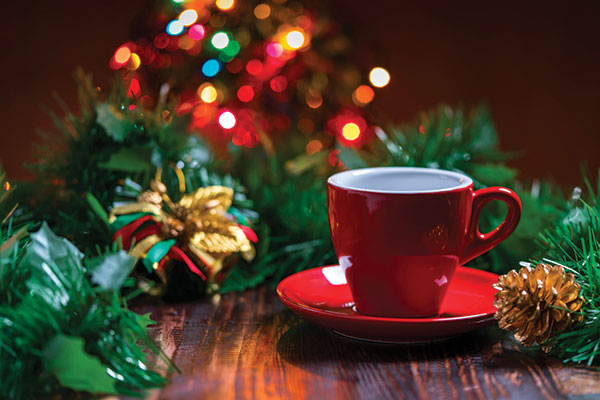Cheers to the Holidays…
Even with Cancer
by Kaylene Chadwell
For most, the holiday season is a wonderful time of year, filled with cherished traditions and time spent with loved ones. However, when you’re dealing with cancer, the holiday hubbub of decorating, shopping, cooking, planning, and cleaning can become exhausting and stressful. While there’s no right or wrong way to celebrate, here are some tips to help you have a cheerful, stress-free holiday season.
Remember the reason for the season.
Think about what the holiday season means to you. Focus on what’s most important to you and your family. Don’t get too wrapped up in getting the best gift for loved ones or making the perfect family dinner. Appreciate being around the people you love and enjoy the memories you make.
Set realistic expectations.
Don’t feel like all your holiday celebrations need to be “perfect.” Overextending yourself and your body in the flurry of festive activities can cause stress, which can make you miss valued quality time with friends and family.
Be with people who lift your spirits.
Spend time with people who make you happier, and not those who drag you down. Don’t feel like you have to spend time around negative relatives just because it’s the holiday season. When you have limited time and energy, it’s best to spend it with the people who matter most to you.
Remember the reason for the season. Focus on what’s most important to you and your family.
Be open to change.
There may be some holiday traditions you just don’t have the time or energy to participate in. Don’t dwell on how cancer has changed your holidays. Modify your usual holiday traditions to meet your needs this year, or create new ones that make the most of your energy. Enjoy those special moments you have with your loved ones.
It’s OK to say no.
Don’t feel obligated to be involved in all the festivities that come your way. Saying yes to everything can lead to stress and exhaustion during this busy time of year. Your loved ones will understand if you can’t participate in every holiday activity. Limit yourself to what you can manage and enjoy.
Ask for and accept help.
You don’t have to do it all, especially by yourself. If someone offers help, accept it. This will help you preserve your energy during the long holiday season. Be realistic about what you can do. If there are certain traditions you want to continue this year, it’s OK to ask for help to make them happen.
Relax.
Sometimes the holidays get so busy we forget to relax. Set aside days where you don’t have much planned. Take a bath. Read a book by the fireplace. Spend time alone to get away from all the holiday craziness.
Maintain a regular routine.
Try to keep your normal mealtimes and sleep schedule. Don’t miss meals. Keep late nights and long days to a minimum, especially when you’re feeling tired. Don’t compromise your health for holiday festivities.
Be mindful of your eating habits.
It’s easy to overindulge when there are holiday parties and seasonal goodies everywhere you look. Control your portions. Eat balanced meals, and avoid drinking excessive amounts of alcohol. Give your body plenty of the healthy food it needs.
Keep moving.
It’s easy to bypass exercise during the holidays, but it’s important to make time for it. Get your loved ones involved. Go on walks with family members, or build a snowman with the kids. Physical activity can help you feel better mentally and physically and give you more energy. Just make sure to talk with your doctor before starting any exercise program.
Make priorities.
You may not have the time or energy to do some activities during this bustling time of year. Figure out what is most important to you and your loved ones. Making a list of the holiday activities you want and need to do can help you see which ones you can skip this year.
Listen to your body.
You won’t always feel up for participating in holiday events. Avoid overworking your body and mind. Take a break from all the festivities when you need to. It’s important to balance activity and rest throughout the holiday season.
This article was published in Coping® with Cancer magazine, November/December 2016.


